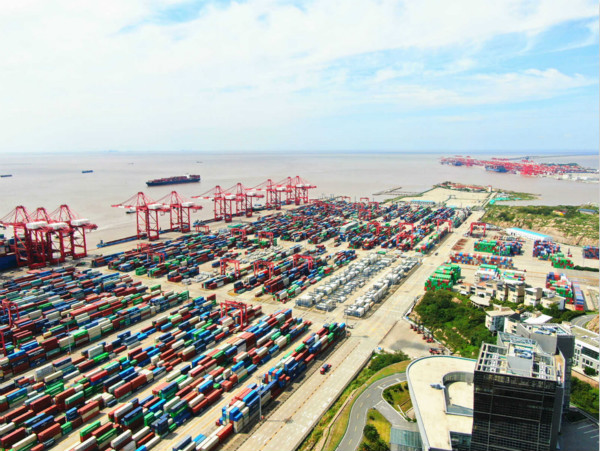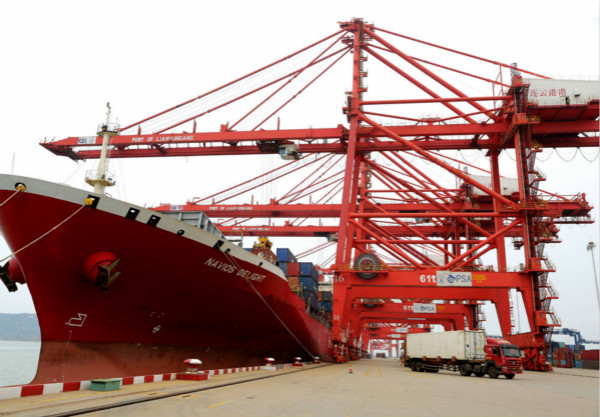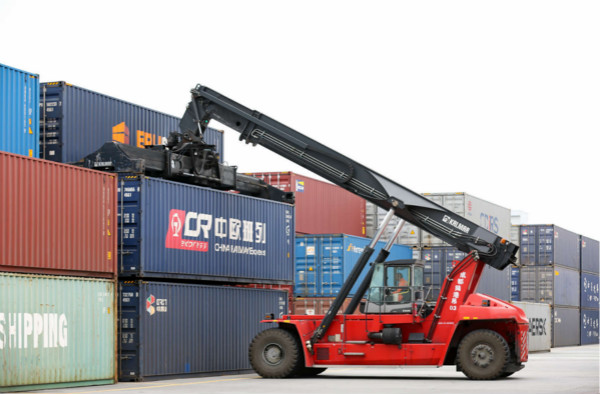China's foreign trade up 0.7 percent in first three quarters of 2020

Photo taken on Sept. 23 shows the Yangshan deep water port of Shanghai. [Photo by Hao Donglei/People's Daily]
China's foreign trade volume in goods hit 23.12 trillion yuan ($3.44 trillion) in the first three quarters of the year, up 0.7 percent from a year ago, according to statistics released by the country's customs.
Exports grew 1.8 percent to 12.71 trillion yuan and imports dropped 0.6 percent to 10.41 trillion yuan. Total exports witnessed positive growth in the January-August period, while total foreign trade registered positive cumulative growth as of September.
Li Kuiwen, spokesperson of the General Administration of Customs (GAC) and director general of the administration's Department of Statistics & Analysis, noted that facing the impacts of COVID-19, China has enhanced its macro policy support and achieved major results in coordinating epidemic prevention and control and social and economic development. The policies of stabilizing foreign trade have continuously gained effects, achieving better-than-expected performance of exports and imports.
The country's foreign trade experienced a sharp decline in the first quarter, and was stabilized in the second and bounced back in the third, with imports and exports growth in the first, second and third seasons standing at -6.5 percent, -0.2 percent and 7.5 percent, respectively.

A vessel is being loaded at a container wharf at Lianyungang Port, east China's Jiangsu province, Oct. 13. [Photo by Wang Chun/People's Daily Online]
Li said that China's exports showcased strong resilience in the January-September period. Exports achieved positive growth for six months in a row since April, growing 1.8 percent in the first three quarters. Medical supplies and "stay-at-home" items contributed 2.2 percent and 1.2 percent to export growth. Besides, the country's work resumption also drove up its exports.
The demand for imports showed stable growth, which resulted to a pick-up of import volume, Li said. China, as the first country to resume work and production of the world, has continuously consolidated its achievements in epidemic prevention and economic recovery. The steady recovery of its domestic economy also facilitated its imports. In the first nine months, the country's imports hit 3.88 trillion yuan, up 4.3 percent than that in the same period last year.
Data from the World Trade Organization (WTO) show that China's foreign trade accounted for 12.6 percent in global trade in the first seven months this year, up 1 percentage point from the same period of last year. Exports accounted for 13.8 percent of the world's total, and imports 11.3 percent, up 1.1 and 0.8 percentage points from a year ago. Both exports and imports hit a record high share in global trade.
The private sector is playing a more prominent role in stabilizing foreign trade. Imports and exports in the sector increased by 10.2 percent to 10.66 trillion yuan in the first three quarters, accounting for 46.1 percent of the country's total foreign trade volume, 4 percentage points higher year on year.
China's foreign trade with major trading partners maintained growth, and ASEAN is the largest one. The country's trade volume with ASEAN, the EU, the U.S., Japan and South Korea hit 3.38 trillion, 3.23 trillion, 2.82 trillion, 1.61 trillion and 1.45 trillion yuan, up 7.7 percent, 2.9 percent, 2 percent, 1.4 percent and 1.1 percent, respectively. China-ASEAN trade volume accounted for 14.6 percent of the country's total.

A crane stacks containers for China-Europe freight trains at a railway port in Chengdu, southwest China's Sichuan province, Oct. 14. [Photo by Bai Guibin/People's Daily Online]
Li introduced that the GAC has rolled out 56 measures to stabilize foreign trade and investment and further facilitate custom clearance. China's import and export clearance times in September were 35.02 and 1.86 hours, respectively, reduced by 64.04 percent and 84.87 percent. The two figures have been on a decline for 5 consecutive months. This year, through exempting and reducing delayed declaration fees and overdue fines, as well as removing interest on deferred taxes for domestically sold processing trade goods, the country has saved nearly 200 million yuan for enterprises.
China's trade with countries and regions related to the Belt and Road Initiative (BRI) amounted to 6.75 trillion yuan in the first three quarters, up 1.5 percent. Exports grew by 2.8 percent to 3.85 trillion yuan and imports contracted by 0.3 percent to 2.9 trillion yuan. Its foreign trade with major partners achieved rapid growth. Its imports and exports with Vietnam, Turkey, Poland, and Thailand were up 18.5 percent, 17.1 percent, 13 percent and 10.9 percent, respectively.
Since this year, the GAC has coordinated epidemic prevention and control and BRI economic and trade cooperation, so as to promote high-quality development of the BRI, Li said. It promoted the cooperation vision of "Smart Customs, Smart Borders and Smart Connectivity," deepened anti-pandemic cooperation, advanced the development of China-Europe freight trains, and actively promoted mutual recognition of Authorized Economic Operators (AEOs).
So far, China has signed AEO mutual recognition agreements with 15 economies, including the EU, Japan and South Korea, which cover 42 countries and regions and account for half of AEO countries and regions. Nineteen countries along the Belt and Road have signed such agreements with China.
























